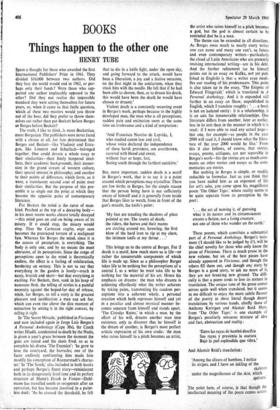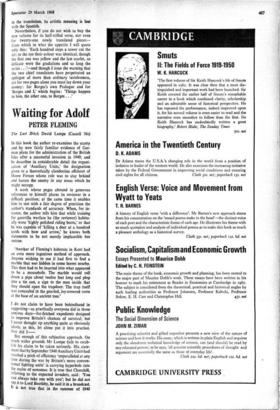Things happen to the other one BOOKS
HENRY TUBE
Spare a thought for those who awarded the first International Publishers' Prize in 1961. They divided $10,000 between two authors. Did they fear the world would end in 1962, or per- haps only their funds? Were those who sup- ported one author implacably opposed to the other? Did they not realise the impossible standard they were setting themselves for future years, or, when it came to that futile question, which of these two masters would you throw out of the boat, did they prefer to throw them- selves out rather than put Beckett before Borges or Borges before Beckett?
The truth, 1 like to think, is more Beckettian, more Borgesian. The publishers were never faced with a choice at all, for fate determined that Borges and Beckett—like Vladimir and Estra- gon, like LOnnrot and Scharlach—belonged together. One could devote a whole essay to their similarities—their finely tempered intel- lects, their academic backgrounds, their immer- sion in the grand stream of western culture, their special interest in philosophy; and another to their points of difference, which form, as it were, a translucent second coat of paint over their similarities. But the purpose of this pre- amble is to single out the point at which they become the opposite poles of contemporary literature.
For Beckett the mind is the curse of man- kind. Perched at the top of a decaying body— in his most recent works almost totally decayed —this mind goes on and on being aware of its misery. If it could stop, the misery would stop. Thus the Cartesian cogito, ergo sum becomes the protracted torture of a malignant fate. Whereas for Borges the mind, since it is the source of perception, is everything. The body is only one, and by no means the most obtrusive, of its perceptions. Since the range of perceptions open to the mind is theoretically endless, the effect is a feeling of exhilaration, bordering on ecstasy. This is not to say that everything in the garden is lovely—much is nasty, brutish and short—but that everything is exciting. For Beckett, then, sunk in his heap of nauseous flesh, the telling of stories is a painful necessity against the hoped-for day of release, while, for Borges, to tell a story is the greatest pleasure and justification a man can ask for, which can even rise above the dire moment of extinction by setting it in the right context, by telling it right.
In The Secret Miracle, published in Ficciones
and now included again in Jorge Luis Borges's A Personal Anthology (Cape 30s), the Czech writer Hladfk, condemned to death by the Nazis,
is given a year's grace between the moment the guns are raised and the shots fired, so as to complete his drama 'The Enemies': 'he grew to
love the courtyard, the barracks; one of the faces endlessly confronting him made him modify his conception of Roemerstadt's charac- ter.' In 'The South,' also included in both books and perhaps Borges's finest story—reminiscent both in its dangerously level tone and its perfect structure of Mann's Death in Venice—Dahl- mann has travelled south to recuperate after an operation, but has become involved in a point- , less duel: 'As he crossed the threshold, he felt that to die in a knife fight, under the open sky, and going forward to the attack, would have been a liberation, a joy and a festive occasion, on the first night in the sanitarium, when they stuck him with the needle. He felt that if he had been able to choose, then, or to dream his death, this would have been the death he would have chosen or dreamt.'
Violent death is a constantly recurring event in Borges's work, perhaps because to the highly developed man, the man who is all perceptions, sudden pain and extinction seem at the same time an irrelevance and a kind of temptation: 'And Francisco Narciso de Laprida, I, who studied canon law and civil, whose voice declared the independence of these harsh provinces, am overthrown, covered with blood and sweat, without fear or hope, lost, fleeing south through the farthest outskirts.'
But, more important, sudden death is a motif in Borges's work, that is to say it is a point around which perceptions may crystallise. There are few births in Borges, for the simple reason that the person being born is not sufficiently aware of himself and it is generally from inside that Borges likes to watch, from in front of the gun's muzzle, the knife's point:
'My feet are treading the shadows of pikes pointed at me. The taunts of death, the riders, the horses and their manes are circling around me, hovering, the first blow of the hard iron to rip at my chest, the intimate knife at my throat. .
This brings us to the centre of Borges. For if death is a motif, how much more so is life—or rather the innumerable components of which life is made up. Since as a philosopher Borges takes life to be nothing but the perceptions of a central I, as a writer he must take life to be nothing but the material of his art. Hence his emphasis on dreams: the man who dreams is achieving effortlessly what the writer achieves by taking pains, transmuting his random per- ceptions into a coherent whole, a personal creation which both expresses himself and yet in a peculiar and almost mystical manner be- comes separate from himself and stands apart. 'The Circular Ruins,' in which a man, by the effort of his will, dreams another man into existence, only to discover that he himself is the dream of another, is Borges's most perfect artistic expression of his own credo: the man who raises himself to a pitch becomes an artist,
the artist who raises himself to a pitch becomes a god, but the god is almost certain to be reminded that he is a man.
The theme can be extended in all directions. As Borges owes much to nearly every writer one can name and many one can't, sq future and even contemporary writers—particularly the cloud of Latin Americans who are presently reviving international writing—are in his debt. And the further refinement (as he himself points out in an essay on Kafka, not yet pub- lished in English) is that a writer even modi- fies our reading of his predecessors. This point is also taken up in the essay, 'The Enigma of Edward Fitzgerald,' which is translated in A Personal Anthology. And it is expanded still further in an essay on Shaw, unpublished in English, which I translate roughly : .. a book is not an isolated entity: it is a relationship, it is an axis for innumerable relationships. One literature differs from another, later or earlier, less in its text than in the manner in which it is read: if I were able to read any actual page— this one, for example—as people in the year 2000 will read it, I should know what the litera- ture of the year 2000 would be like.' From this it also follows, of course, that stories, essays, poems, critiques, are not separable in Borges's work—for the stories are as much com- ments on other stories and essays as the com- mentaries are stories.
But nothing in Borges is simple, or readily reducible to formulae. Just as you think that you have nailed him as an exponent of life for art's sake, you come upon his magnificent poem 'The Other Tiger.' where reality seems to be quite separate from its perception by the poet: . . the act of naming it, of guessing what is its nature and its circumstances creates a fiction, not a living creature, not one of those who wander on the earth.'
These poems, which constitute a substantial part of A Personal Anthology, Borges's testa- ment CI should like to be judged by it'), will be the chief novelty for those who only know the prose of Ficciones. There is much prose in the new volume, but six of the best pieces have already appeared in Ficciones, and though the others fill them out, and though any story by Borges is a good story, to ask no more of it, they are not breaking new gtound. The diffi- culty is that a poem tends to lose its texture in translation. The unique tone of the prose comes across quite well when translated, but it seems to me difficult to enjoy the more subtle flavour of the poetry in these literal though decent translations by various hands, chiefly those of Anthony Kerrigan and Alastair Reid. Here, from 'The Other Tiger,' is one example of Borges's peculiarly sensuous mixture of idea and fact, abstraction and reality: 'Entre las rayas de bambti descifro Sus rayas y presiento la osatura Bajo la piel esplendida que vibra.'
And Alastair Reid's translation: 'Among the slivers of bamboo, I notice its stripes, and I have an inkling of the skeleton under the magnificence of the skin, which quivers.
The point here, of course, is that though the intellectual meaning of the poem comes across in the translation, its artistic meaning is lost with the Spanish.
Nevertheless, if you do not wish to buy the new volume for its half-stifled verse, nor even for twenty-one newly translated pieces— from which to whet the appetite I will quote only this: 'Each hundred steps a tower cut the air; to the eye their colour was identical, though the first one was yellow and the last scarlet, so delicate were the gradations and so long the series .. 2—and though I issue the warning that the two chief translators have perpetrated an epilogue of more than ordinary tastelessness, yet for two pages alone you must lay down your money: for Borges's own Prologue and for 'Borges and I,' which begins: 'Things happen to him, the other one, to Borges ...'







































 Previous page
Previous page